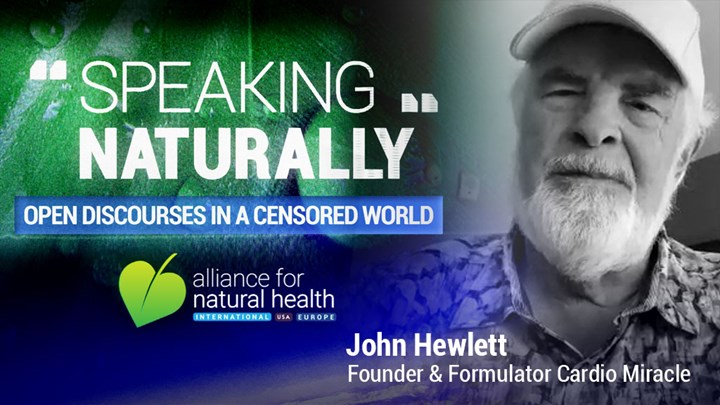At the end of last week, we leaked a letter sent by Elizabeth Williamson, a Reading University professor, to Andrew Lansley, the UK Health Minister.
So far, we have received no direct response from the good Professor. All we have seen are her comments to journalist Shane Starling, made during an interview for a Nutraingredients article. We'd like to stress that contrary to the title of the article, we didn't attack the professor. We simply exposed a letter that we believe contained misleading information that we presume, given the stated, intended recipient, was destined for the Health Minister. We in turn put on public record our comment to Prof Williamson in a second letter, as well as a third letter to the Health Minister, which provided our views on what appeared to be serious misconceptions contained in the professor's original letter.
Professor Williamson told Nutraingredients that to leak something like this, “Casts aspersions on my professional career and my department and implies that I am inept and corrupt.” She also said that she was, “Crushed and devastated by it and haven’t slept in four days”. Apart from suggesting that she might benefit from some valerian, we'd like to direct Professor Williamson to our reply, posted on the Nutraingredients site:
Please don't lose sleep, Prof Williamson
We are sorry that Prof Williamson has chosen to take this personally, but she hasn't been attacked! Her ideas written in a letter have however been contested. But this is not about her, us or any of the people in the herbal sector. It is about the fundamental way in which foods and medicines are treated by regulators in the UK and Europe more generally. The implications for consumers of a government, such as the UK, following the advice given by Prof Williamson, are huge. Prof Williamson has previously published important papers showing how dietary components and food supplements can have therapeutic properties (e.g. Phytother Res. 2007; 21(2): 99-112) - now she implies, through her letter, that these same products should be removed from the market unless they are authorised successfully as drugs (under the THMPD scheme, which guarantees neither safety nor efficacy, or using the 'well established use' or full marketing authorisation routes). The sheer cost and practicalities of this mean that the vast majority would be lost from the market. Polyherbal products would be the most severely affected, yet these are the ones with the strongest evidence of benefit, particularly from non-European traditions. I am at a loss as to why Prof Williamson doesn't simply justify her position, rather than losing sleep.
The paper makes extensive reference to beneficial and even therapeutic properties of foods, food ingredients and herbal food supplements, so it is a surprise that Prof Williamson now appears to suggest that such products should be regulated as drugs.
We will keep you posted on any response we get from Prof Williamson.








Comments
your voice counts
22 November 2011 at 6:24 pm
I am at a complete loss to understand why you think that by questioning Prof Williamson's academic independence and integrity - not just once, but several times - it wasn't an attack and that you don't expect her to take it personally!
Having had a chance to read over everything now, I am very disappointed in your response to her and to Lansley - I'm sure it would have been perfectly possible for you to make your argument, saying what points you disagree with and why without resorting to innuendo and unsubstantiated claims of bias.
Let's maintain the moral high ground in future.
23 November 2011 at 6:18 am
The comment left on your webpage looked like a very personal attack on her.
23 November 2011 at 4:00 pm
Dear Jo
Thank you for your comment, which we of course take very seriously.
It is surely a matter of semantics whether you wish to consider our challenge of Prof Williamson's letter as an attack, a challenge or a contestation. We don't see it as an attack simply because it wasn't personal. We are however challenging the views expressed in the letter and felt that it was in the public interest to ensure these views were put into the public domain, along with our own views on why some of the points were seriously misconceived. The fact remains that the letter had been intended to influence a Minister to encourage him to spurn the MHRA to crackdown on companies selling botanical food supplements. Prof Williamson's letter itself could equally be viewed as an attack on the herbal food supplement sector (one that was intended to occur without its knowledge), and, if this intent was to be followed through, the implications for consumers continuing to be able to access herbal products on which they relied would be devastating.
The greatest problem is that the justifications that Prof Williamson used were peppered with serious misconceptions, eight of which Dr Verkerk attempted to clarify in his response to Prof Williamson.
You indicate that we have resorted to innuendo, but an innuendo is a baseless invention of thoughts or ideas. We presume that the point that is most sensitive is our assertion that Prof Williamson's position is in line with that of the phytopharmaceutical companies. This is not innuendo, but an assertion based on fact. She stated in her letter to Andrew Lansley "…so it is particularly unfair that those responsible SMEs who were encouraged by the MHRA to invest heavily in complying with the new Directive now find their businesses under threat." It is a matter of fact, not innuendo, that this is the same position taken by the phytopharmaceutical companies that have gained most of the licenses. Professor Williamson has therefore aligned this argument, deliberately or unwittingly, with the phytopharmaceutical companies and has even indicated that she sees competition with botanical food supplements as "particularly unfair" for the license holders.
You also indicate we have made "unsubstantiated claims of bias." Where? We felt the need to respond in the manner that we did, because had we been more subtle, we may not have been heard. This in turn would have made it more likely that the steamroller that is made up of medicines regulators in national governments, armed with poorly conceived EU laws, misinterpreted not only by them, but also it seems by some academics, were set to to do untold damage to consumers' ability to access a wide diversity of herbal products used by them to manage their health. Such government action to remove botanical food supplements from the market would also do untold damage to herbal traditions, especially non-European ones, that have been widely used in Europe.
In reference to your final point, we were trying to do exactly that: maintain the moral high ground…..
24 November 2011 at 4:17 pm
I'm not sure how you can state that Prof. Williamson has academic independence and integrity, when the letter clearly shows that she doesn't.
Unfortunately it has taken the ANH to leak this document to the wider natural health community to show us how people who we trust are supporting us in our quest against the ongoing march of the Codex and THMPD are not all they make out to be.
Thank you ANH keep up the good work.
25 November 2011 at 2:45 pm
Anyone who supports the pharmaceutical industry and seeks to deny it any competition is suspect and deserves questioning on their motives and honesty. Side effects from 'safety tested' pharmaceuticals kill a million people a year and Prof. Williamsons time would be better employed investigating this. Studies that expose these side-effects are frequently covered up by the companies whose only interest is to make profit and academics who are frequently and secretly employed to make the industys case for their aim for the total monopoly of healthcare. While a few cases of harm caused by herbal medicine have been given great publicity any such problems are dwarfed by the terrible consequences of many widely used mainstream drugs that are never heard about. Herbal medicines often have thousands of years of use to verify their safety and efficacy and their basic chemistry is of the same evolutionary processes as our bodytchemistry yet the prof is lending her voice to those who want take them from us for corporate gain. All ethical academics in the field should be working to proving the efficacy of cheap herbal products for the good of all humanity - work that will never be done by an industry that needs patentable, profitable, new product to sell to the wealthy. She lends her voice to those who would take away the liberty of choice for our own health and is upset about the reaction- tough - if she cant stand the heat she shouldve stayed outa this kitchen. If she has valid reasons for her aim of limiting our already reduced choices she should give them here instead of trying to have covert influence over lawmakers and then wanting to run and hide.
25 November 2011 at 5:17 pm
I am so glad that this awful woman was exposed. I am surprised that there are those who feel it shouldn't be personal. It should be personal. If someone shows themselves to lack integrity, to be two-faced, to be someone willfully harming others in a sneaky, secretive way, they not only deserve to be exposed, they deserve to be ostracized entirely. 'Prof' Williamson will never again get so much as a 'how do you do' from me and anyone who behaves as she does deserves the same. When people lack integrity in their profession they deserve no personal considerations either.
28 November 2011 at 9:13 am
I absolutely applaud your work here and I wonder "what is wrong with this picture" when people don't drop their jaws in awe at the mere notion that it might be okay to propose that health-giving products should be held from the public because it might cut into the profits of big corporations. Seriously. That's so clearly revealing, and is exactly why we need organizations like ANH to offset the financial and political clout of vested interests that inevitably make more money if the public has less access to health-giving products and information. It's disgusting.
28 November 2011 at 4:51 pm
Following the story released on Friday about 'The Safer Herbal Medicine Campaign' (SHMC), it's possible that Professor Williamson was co-opted into it by SHMC (unwittingly or otherwise).
Your voice counts
We welcome your comments and are very interested in your point of view, but we ask that you keep them relevant to the article, that they be civil and without commercial links. All comments are moderated prior to being published. We reserve the right to edit or not publish comments that we consider abusive or offensive.
There is extra content here from a third party provider. You will be unable to see this content unless you agree to allow Content Cookies. Cookie Preferences